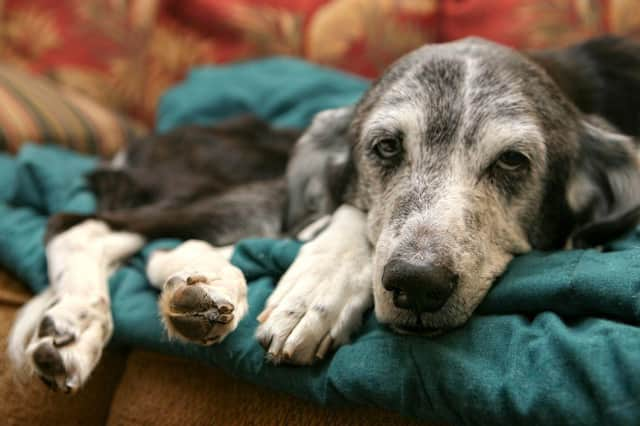Dog Dementia: How common is dog dementia, symptoms, causes, which breeds, diet, treatment and will it get worse quickly?
This article contains affiliate links. We may earn a small commission on items purchased through this article, but that does not affect our editorial judgement.


A dog’s senior years unfortunately often come with more frequest visits to the vet – and it’s a sad fact that age hits our pups far sooner than with humans.
It’s usually at around seven years-of-age that the canine golden years begin, and this is when conditions like dementia can start to show – known as Canine Cognitive Dysfunction.
Advertisement
Hide AdAdvertisement
Hide AdTo ensure you can give your pet the care it needs, grain free dog food brand Barking Heads’ vet, Dr Scott Miller, has shared the signs of dementia in dogs to look for, the breeds more at risk, how you can make life more comfortable for your four-legged friend and when to take them to the vet.
Here’s what he had to say.
How common is dementia in dogs?
Canine Cognitive Dysfunction affects nearly a third of dogs aged between 11 and 12. The chances of a pup feeling the effects of dementia double when they
reach around 15 to 16 years old.
What causes dementia in dogs?
There isn’t one set cause to pinpoint unfortunately. Factors like genes and previous health issues can contribute to your dog developing dementia, but it’s usually down to old age. One study revealed that smaller breeds - like Chihuahua, Miniature Pinscher and Papillion - that are less active are more likely to develop the condition than their larger counterparts. However, this may be because little pups tend to have a longer lifespan.
What does dog dementia look like?
You likely won't witness all of them at once, but here are some signs of dog dementia to look out for:
- Accidents around the house
- Confusion with commands or name
- Disorientation in familiar settings
- Unusual barking
- Lack of appetite
- Little to no interest in playing and greeting people
- Separation anxiety
- Disrupted sleeping patterns
- Short temper and uncommon aggression
- Repetitive behaviours
- Staring at walls
How fast does dog dementia progress?
According to research, there are three distinct stages of progression, which level from mild to severe, with symptoms worsening and ramping up as time goes on. This can take from six months to a year between stages worsening.
Mild: Symptoms include slight changes to your dog's sleep cycle and social interactions. They may become clingy and needy at times or irritable at
others. You may also notice them stop showing greeting behaviour around other people and dogs.
Moderate: Behavioural changes are confusion and hyperactivity at night leading to more sleep during the day to make up. A pup may also have more toilet
accidents in the house.
Advertisement
Hide AdAdvertisement
Hide AdSevere: Characteristic traits are unusual barking, a short temper, confusion over commands, plus little interest in playing and interactions.
Ideally, Canine Cognitive Dysfunction is recognised and diagnosed by a vet in the mild to moderate phase to make life easier for a poorly pup.
Is there a cure for dementia in dogs?
Like with humans, there is sadly no known cure. A vet will offer treatment options to ease a pup, try to slow the progression of the disease and give an
owner greater peace-of-mind. These may include:
- Medication
- Supplements
- Life enrichment options for mental stimulation – from food puzzle toys to practicing commands and play with other dogs
Can a change in a dog's diet help with dementia?
Yes, senior dogs require a special diet. Senior dog food is specially formulated with added vitamins and minerals for joint support, while providing optimal protein levels to support their digestion. Dry dog food and wet food for seniors work equally well. Consider their size, too – small breed dry dog food for later years is available which is brilliant given little ones’ propensity to dementia. Ultimately, tailoring nutrition to your dog’s needs is vital. Indeed, it’s been proven that pups who enjoy diets full of antioxidants and vitamins may have a slower rate of decline in their later years.
What can you do to reduce the effects of dementia in a dog?
There may be no cure, but there are steps a pet parent can take to keep their dog’s mind active and therefore promote good cognitive health and stave off the devastating effects of Canine Cognitive Dysfunction. Activities include:
- Teaching an old dog new tricks
- Nourishing them with a well-balanced diet
- Avoiding stressful situations – if they find themselves in an anxiety-inducing situation, tips to relieve stress in dogs include hugging them
- Playing games together
- Exercising on a good walk or run (mobility-dependent)
- Exploring brain health supplements
- Arranging play dates with other dogs (so long as they don’t feel overwhelmed or overexerted)
- Creating new experiences
Advertisement
Hide AdAdvertisement
Hide AdHow to help a dog with dementia
It’s worth gently examining a dog every so often to see if anything on their body has changed, particularly in later years. This also acclimatises them to being inspected by a vet. Take note of any behavioural changes, too. If you’re concerned that your pet is showing signs of Canine Cognitive Dysfunction, book an appointment with your vet.
Little lifestyle changes - like exercise and enrichment through toys - will keep their brain stimulated. Showing them lots of love will offer reassurance, but remember that every dog and how a condition affects them is different, so if they need to retreat for alone time, it’s wise to respect that. Dementia is an upsetting diagnosis that can leave an owner feeling helpless but control the controllable - ensure their later years are defined by care and fulfilment.
Comments
Want to join the conversation? Please or to comment on this article.